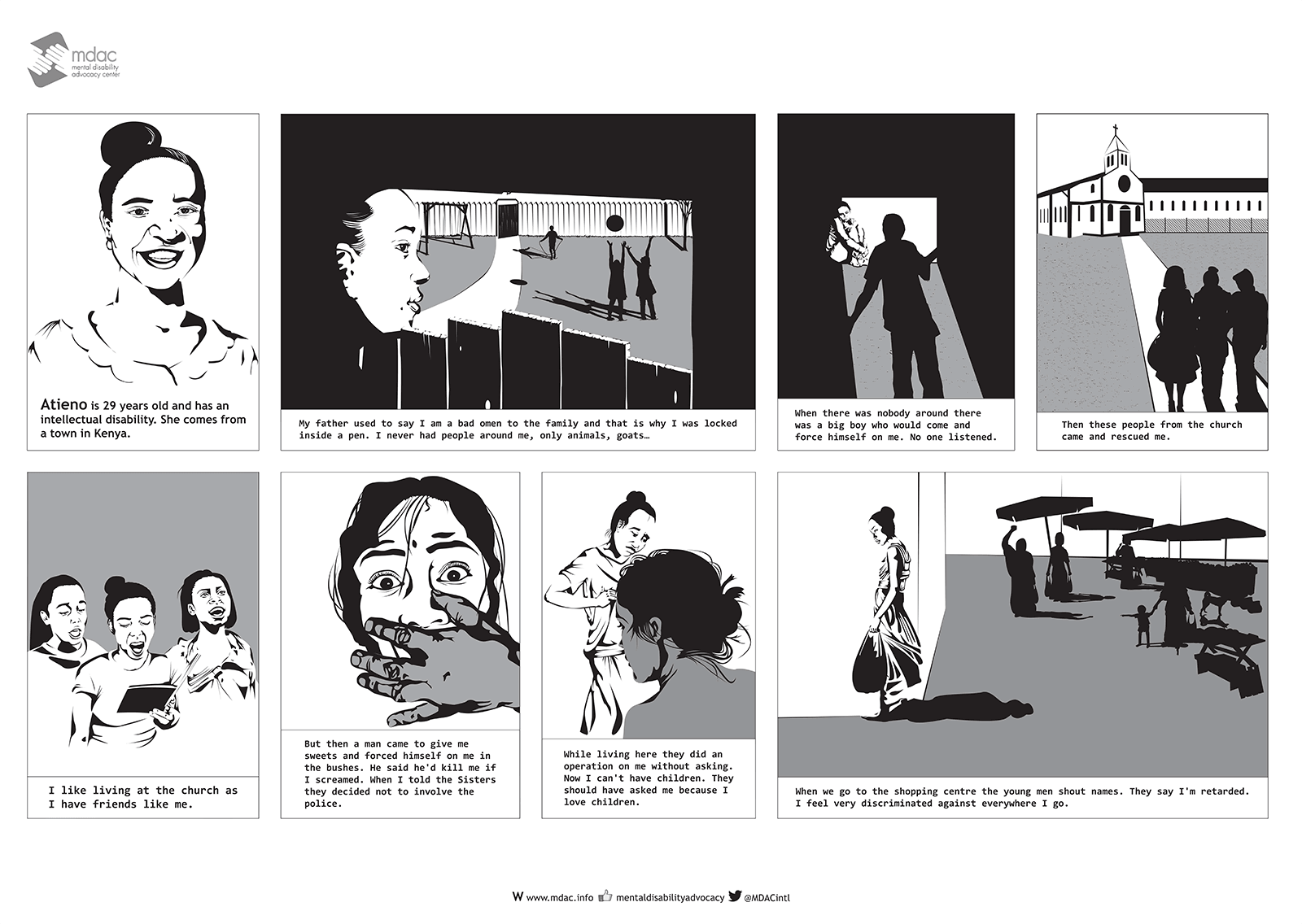Regional African treaty has potential to “strengthen implementation” of disability rights on the continent
MDAC has provided detailed recommendations to the African Commission on Humans and Peoples’ Rights (ACHPR) as it develops a regional Protocol on the Rights of Persons with Disabilities in Africa. The submission draws on MDAC’s extensive research on the lives of people with mental disabilities in Kenya, Uganda and Zambia and calls for “effective remedies” for human rights violations.
 The story of Atieno, a woman with an intellectual disability from rural Kenya. © MDAC.
The story of Atieno, a woman with an intellectual disability from rural Kenya. © MDAC.
The Protocol represents the first attempt internationally to develop a specific regional disability rights instrument since the UN Convention on the Right of Persons on Disabilities (CRPD) was adopted in 2006. So far, the CRPD has been ratified by 45 of the 54 Member States of the African Union, and MDAC calls on the African Union (AU) to keep up the pressure on those yet to ratify. MDAC’s submission on the proposed new African treaty stresses the need to tackle a number of specific continent-wide issues affecting the lives of persons with disabilities including barriers to accessing justice (including in traditional justice systems), harmful practices such as chaining and tying, and explains that specific measures are required for women, children and older persons with disabilities.
In 2014, MDAC released findings of the first investigation in Africa on the right to legal capacity for people with mental disabilities, in Kenya. The report uncovered that the vast majority of people with mental disabilities in the country experienced significant restrictions on their autonomy through informal social processes, limited or no access to support, and inaccessible justice systems. People interviewed for the research reported land grabs by family members, forced sterilisation and denial of the right to stand for public office without effective ways of gaining redress. MDAC’s submission to the ACHPR calls for action to tackle the issue of ‘de facto guardianship’, reflecting recent recommendations from the UN Committee on the Rights of Persons with Disabilities (CRPD Committee) to Kenya.
MDAC also points out that the proposed African Protocol must do nothing to undermine the UN Convention on the Rights of the Persons with Disabilities (CRPD) which continues to the represent the most “widely-accepted and authoritative” source of international law regarding people with disabilities. The opportunity, however, is for Member States of the African Union to commit to tackling a number of specific issues, including the problematic role of traditional healers.
As MDAC's report states, “many people with disabilities in African societies have limited access to conventional health services”, meaning that many are reliant on African traditional medicine practitioners. Extensive research undertaken in Zambia showed the difficulties of people with mental health issues who, in some cases, had no conventional health facilities available to them for hundreds of kilometers. With no other choices but to turn to unregulated traditional healers, interviewees for the study revealed shocking practices including non-consensual sex as a method of “treating” women with mental health issues, as well as beatings and chaining. Yet, MDAC explains that there should be recognition and regulation of the “potentially important contribution alternative health providers can make to achieving the right to health.” Instead, the submission recommends “regular and systematic monitoring” of all settings where people with disabilities access care or services, including traditional healing centres and prayer camps.
A number of concerns were raised regarding specific provisions which offer less protection to people with disabilities than set out in the CRPD. Regarding women with disabilities, there was no acknowledgement of “multiple and intersectional forms of discrimination which create greater barriers” to them exercising their rights. MDAC’s research in Uganda found that women with disabilities often had serious restrictions on their autonomy due to being subjected to situations of financial dependency and denial of access to the labour market. On the right to liberty, the submission notes that “involuntary psychiatric detention poses a number of challenges to governments around the world” but that action was needed to deal with discriminatory legislation in Africa that frequently allows for detention with limited or no legal protections.
Going forward, MDAC offers its technical and practical assistance to ensure that the new African treaty truly responds to the lives of people with disabilities on the continent, which the World Health Organization estimates to number 80 million people. This year, MDAC will provide specialist training to lawyers from Uganda and Zambia to take cases for torture victims, as well as initiating cases in Kenya to tackle informal guardianship.

